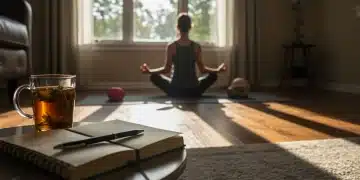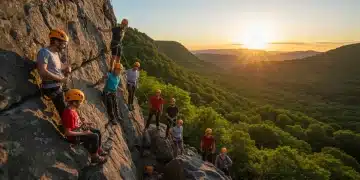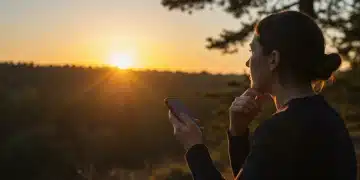Wellness Travel: Top 3 Retreat Styles Americans Seek for Rejuvenation in 2025
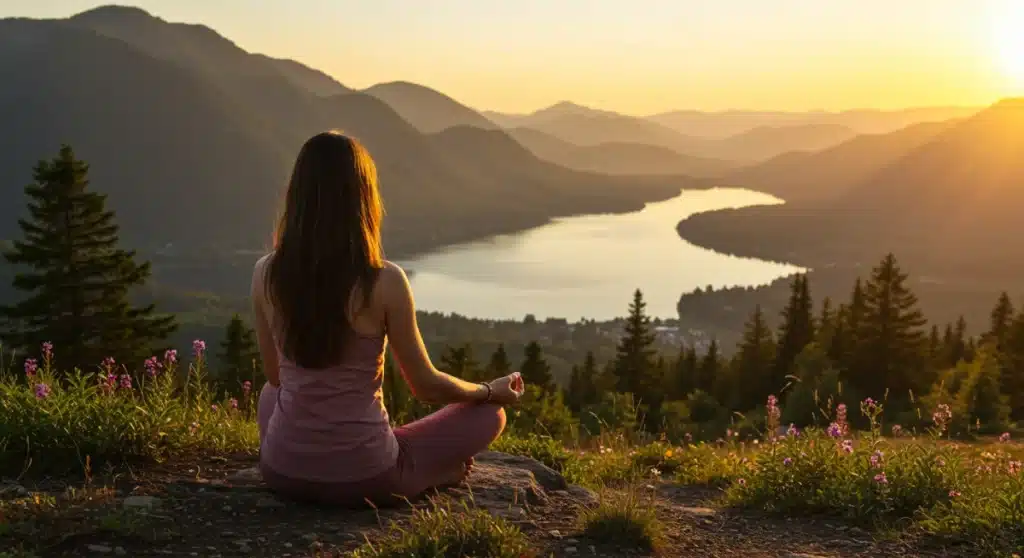
Americans are increasingly seeking transformative experiences, driving a surge in wellness travel. The top three retreat styles for 2025 are emerging as mindful escapes, adventure wellness, and holistic healing, reflecting a collective desire for deeper rejuvenation and personal growth.
The landscape of leisure travel is rapidly evolving, with a significant shift towards experiences centered on mental, physical, and spiritual well-being. As of late 2024, industry reports and booking trends indicate a substantial surge in demand for wellness travel retreats, revealing that Americans are actively seeking specific styles of rejuvenation for 2025. This growing trend highlights a collective desire to disconnect from daily stressors and reconnect with oneself through intentional, health-focused journeys.
The Rise of Mindful Escapes
Mindful escapes are leading the charge in wellness travel, offering participants environments designed for deep introspection and mental clarity. These retreats prioritize practices that foster inner peace and reduce stress, appealing to individuals overwhelmed by the demands of modern life. The emphasis is on quiet reflection and structured activities that promote mental well-being.
Recent data from leading travel agencies and wellness platforms show a 40% increase in bookings for retreats specifically labeled as ‘mindfulness’ or ‘meditation-focused’ for the upcoming year. This indicates a strong consumer preference for journeys that offer more than just relaxation, but genuine mental restoration.
Key Components of Mindful Retreats
These retreats are meticulously crafted to provide a sanctuary from external noise. They often incorporate elements that guide participants towards a more present and calm state of mind. The design of these programs is deliberate, aiming for a holistic mental reset.
- Guided Meditation Sessions: Daily practices led by experienced instructors to cultivate focus and inner peace.
- Digital Detox Policies: Encouraging participants to disconnect from electronic devices to fully engage with their surroundings and inner experience.
- Silent Retreats: Dedicated periods of silence to deepen self-awareness and contemplation.
- Breathwork Workshops: Techniques to regulate breathing, reduce anxiety, and enhance overall well-being.
The locations for mindful escapes are typically secluded, ranging from serene mountain hideaways to tranquil coastal resorts. These settings are chosen to enhance the feeling of detachment and immersion in nature, further supporting the journey towards mindfulness. The goal is to create an environment where stress naturally dissipates.
Adventure Wellness: Blending Thrills with Tranquility
A significant segment of Americans is now combining their quest for well-being with a desire for adventure. Adventure wellness retreats integrate physical challenges and outdoor exploration with restorative practices, offering a dynamic approach to rejuvenation. This style caters to those who find their peace through movement and connection with nature’s raw beauty.
Reports from adventure travel specialists confirm a growing trend, with bookings for adventure wellness experiences up by 35% compared to the previous year. This hybrid model appeals to individuals who seek an active form of self-care, where physical exertion is balanced by mindful recovery.
Popular Adventure Wellness Activities
These retreats are not just about pushing physical limits; they are about using physical activity as a pathway to mental clarity and emotional release. The activities are chosen to be engaging and invigorating, fostering a sense of accomplishment and vitality.
- Hiking and Trekking: Exploring scenic trails, from gentle walks to challenging mountain ascents, often incorporating mindful walking techniques.
- Yoga and Pilates in Nature: Practicing physical postures in breathtaking outdoor settings, enhancing connection to the environment.
- Water Sports: Kayaking, paddleboarding, or surfing, which offer both physical challenge and a meditative connection to water.
- Rock Climbing or Bouldering: Activities that build strength and focus, often in stunning natural landscapes.
Locations for adventure wellness retreats are as varied as the activities themselves, including national parks, remote wilderness areas, and coastal regions. These destinations provide the perfect backdrop for engaging in invigorating physical pursuits while also offering opportunities for quiet reflection and appreciation of natural beauty. The synergy between adventure and wellness is key.
Holistic Healing Journeys
Holistic healing journeys represent a profound commitment to comprehensive well-being, addressing the individual on all levels: physical, mental, emotional, and spiritual. These retreats delve deeper than surface-level relaxation, often incorporating ancient practices and alternative therapies to facilitate profound personal transformation. This style is gaining traction among those seeking a more integrated and transformative approach to health.
An analysis of consumer preferences by wellness industry groups indicates a 30% increase in interest for retreats focusing on holistic healing modalities. This suggests a growing awareness and acceptance of alternative health practices as legitimate paths to rejuvenation.
Diverse Approaches to Holistic Wellness
Holistic retreats often feature a blend of traditional and contemporary healing methods, tailored to individual needs. The aim is to restore balance and harmony within the body and mind, fostering long-term well-being. These programs are often personalized, ensuring that each participant receives targeted support.
- Ayurvedic Treatments: Ancient Indian healing practices involving diet, massage, and herbal remedies.
- Traditional Chinese Medicine (TCM): Including acupuncture, herbal medicine, and Qigong to balance the body’s energy.
- Sound Healing: Using vibrations from instruments like singing bowls or gongs to promote relaxation and healing.
- Energy Work: Practices such as Reiki or chakra balancing to address energetic imbalances.
Many holistic healing retreats are situated in environments conducive to deep healing, such as spiritual centers, eco-resorts, or specialized wellness clinics. These locations often provide organic, locally sourced meals, contributing to the overall detoxification and nourishment process. The environment itself plays a crucial role in the healing journey, supporting a sense of calm and natural restoration.
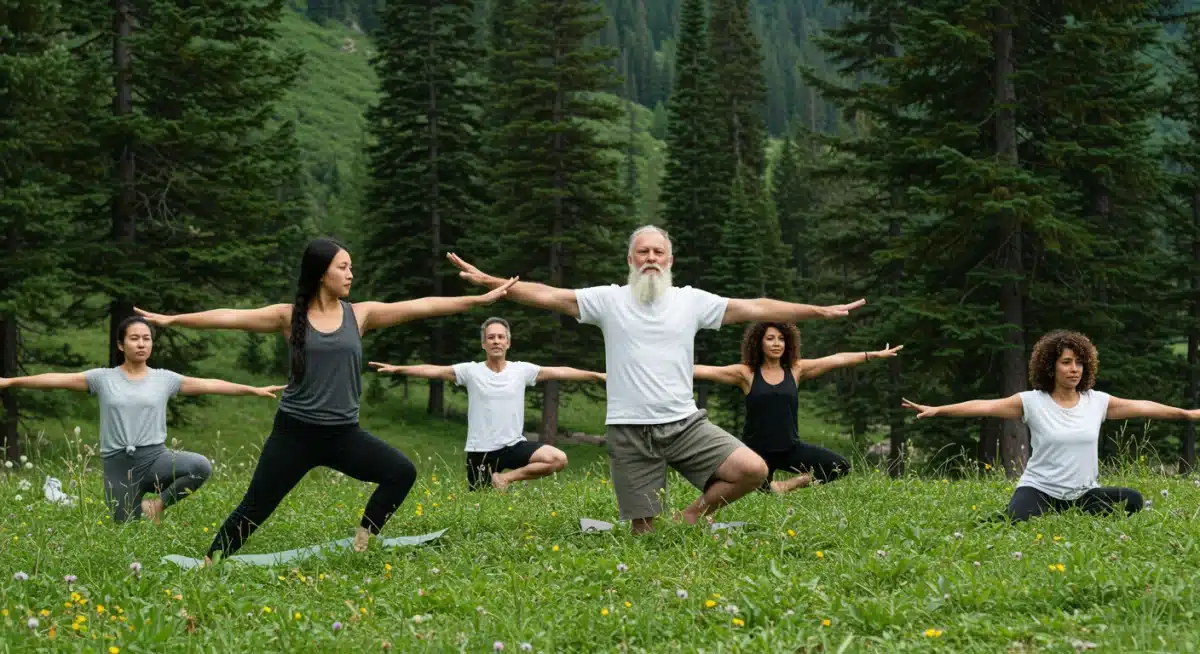
The Economic Impact and Accessibility
The burgeoning interest in wellness travel retreats is not just a lifestyle trend; it’s a significant economic driver. The wellness tourism sector is projected to continue its rapid expansion, creating new opportunities for destinations, hospitality providers, and specialized practitioners. This growth underscores a shift in consumer spending priorities, moving towards experiential and health-focused investments.
As demand increases, so does the diversity of offerings, making wellness travel more accessible to a broader demographic. Retreats are now available at various price points and durations, from weekend getaways to week-long immersive programs. This expanded accessibility ensures that more individuals can partake in these transformative experiences, regardless of their budget or time constraints.
Expanding Market and Inclusivity
The market for wellness travel is becoming increasingly inclusive, with specialized retreats catering to specific needs and preferences. This diversification ensures that everyone can find a retreat that resonates with their personal wellness goals. Providers are adapting to meet the varied demands of a health-conscious public.
- Budget-Friendly Options: More affordable retreats emerging, often in glamping or community-focused settings.
- Luxury Wellness: High-end retreats offering bespoke services and exclusive experiences.
- Specialized Programs: Retreats for specific demographics, such as solo travelers, couples, or those with chronic health conditions.
- Online and Hybrid Models: Some retreats now offer virtual components, blending in-person experiences with digital support.
This expansion also includes a greater focus on sustainable and ethical practices within the wellness travel industry. Many retreats are committed to supporting local communities and minimizing their environmental footprint, aligning with the values of their health-conscious clientele. The industry is maturing, with a greater emphasis on responsible tourism.
Future Trends in Wellness Travel Retreats
Looking ahead, the evolution of wellness travel retreats will likely continue to be shaped by technological advancements and a deeper understanding of human well-being. Emerging trends suggest even more personalized and data-driven approaches to self-care, integrating cutting-edge science with ancient wisdom. The industry is poised for continuous innovation, responding to evolving consumer needs.
Experts predict a greater emphasis on preventative health and longevity-focused retreats, as individuals seek proactive ways to maintain their health. This forward-thinking approach will likely incorporate diagnostics and personalized health plans, moving beyond general relaxation to targeted interventions. The focus will be on sustained well-being.
Innovations on the Horizon
The integration of technology and personalized medicine will play a crucial role in the future of wellness travel. These innovations will allow for more tailored experiences, maximizing the impact of each retreat. The aim is to make wellness journeys even more effective and relevant to individual health profiles.
- Personalized Health Assessments: Pre-retreat diagnostics to tailor programs based on individual genetic, metabolic, and lifestyle data.
- AI-Powered Wellness Coaching: Utilizing artificial intelligence to provide continuous support and guidance before, during, and after a retreat.
- Biohacking Retreats: Focusing on optimizing human performance through advanced nutrition, sleep optimization, and recovery techniques.
- Virtual Reality (VR) Integration: Enhancing meditative experiences or offering immersive nature simulations for those with limited mobility.
Furthermore, there is an anticipated rise in retreats that combine wellness with professional development, offering programs that enhance both personal and career growth. This could include leadership training integrated with mindfulness practices or creativity workshops set in inspiring natural environments. The convergence of personal and professional development is a key area of growth.
Choosing Your Ideal Wellness Escape
With such a diverse array of wellness travel retreats available, selecting the ideal experience requires careful consideration of personal goals and preferences. Whether seeking profound mental clarity, invigorating physical challenge, or a holistic overhaul, understanding the distinct offerings of each retreat style is paramount. The right choice can profoundly impact the effectiveness of the rejuvenation process.
Prospective travelers should evaluate their current needs and what they hope to achieve from their journey. A well-matched retreat can provide lasting benefits, while a mismatch might lead to disappointment. It’s about aligning the retreat’s philosophy and activities with one’s personal aspirations for well-being.
Factors to Consider Before Booking
Making an informed decision involves more than just looking at attractive brochures. It requires a deeper dive into the program’s specifics, the credentials of its facilitators, and the overall environment. These considerations ensure a truly beneficial and transformative experience.
- Personal Wellness Goals: Define what you want to achieve – stress reduction, physical fitness, emotional healing, spiritual growth.
- Program Structure and Activities: Review the daily schedule to ensure it aligns with your interests and energy levels.
- Location and Environment: Consider whether a secluded mountain, a bustling city, or a serene beachfront best supports your desired outcome.
- Facilitator Credentials: Research the experience and qualifications of the instructors and practitioners.
- Budget and Duration: Match the retreat to your financial capacity and available time off.
Ultimately, the goal is to invest in an experience that not only offers a temporary escape but also equips you with tools and insights for sustained well-being long after the retreat concludes. The selection process itself can be a mindful exercise, setting the stage for a successful journey towards rejuvenation. The outcome should be a lasting positive impact on one’s life.
| Key Retreat Style | Brief Description |
|---|---|
| Mindful Escapes | Focus on mental clarity, stress reduction, and inner peace through meditation and digital detox. |
| Adventure Wellness | Combines physical challenges and outdoor exploration with restorative practices for dynamic rejuvenation. |
| Holistic Healing | Addresses well-being on all levels (physical, mental, emotional, spiritual) using ancient and alternative therapies. |
| Increased Accessibility | Growing diversity in offerings, price points, and durations making wellness travel available to more people. |
Frequently Asked Questions About Wellness Travel
Wellness travel is specifically designed to improve mental, physical, or spiritual well-being through structured activities and intentional experiences. Unlike typical vacations focused on leisure, wellness trips aim for personal growth, healing, and rejuvenation, often incorporating educational components for sustained health benefits post-trip.
No, wellness retreats cater to a broad audience. While some are tailored for specific health concerns, many are designed for general stress reduction, personal development, or simply to help individuals disconnect and recharge. They are increasingly popular among those seeking preventative care and a healthier lifestyle.
The cost of wellness retreats varies significantly based on location, duration, included activities, and level of luxury. Prices can range from a few hundred dollars for a weekend getaway to several thousands for an all-inclusive, week-long immersive program. Budget-friendly options are becoming more prevalent.
Packing essentials often include comfortable clothing for movement and relaxation, swimwear if water activities are planned, reusable water bottles, a journal, and any personal medications. Digital detox retreats will advise leaving electronics behind. Specific needs depend on the retreat’s focus and location.
Absolutely. Many wellness retreats are designed with solo travelers in mind, providing a supportive environment for individual introspection and growth. They offer a unique opportunity to focus solely on oneself without external distractions, often fostering a sense of community among participants.
Looking Ahead
The continued evolution of wellness travel retreats signifies a fundamental shift in how Americans approach personal health and leisure. As the market matures, we anticipate a greater emphasis on personalized experiences, integrating advanced health diagnostics with traditional healing practices. The industry will likely see further innovation in sustainability and accessibility, ensuring that these transformative journeys are available to an even broader audience. Watch for continued growth in niche retreats catering to specific health goals and lifestyle preferences, solidifying wellness travel’s role as a cornerstone of modern well-being.

